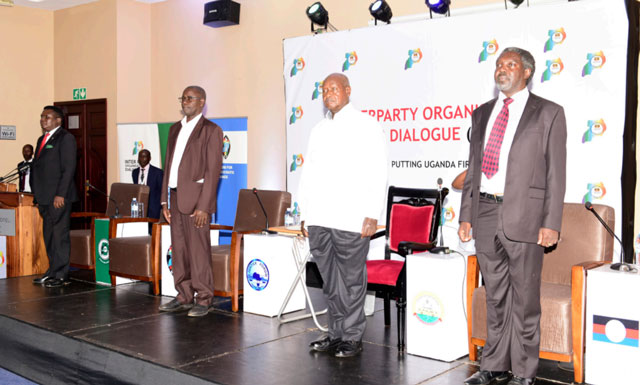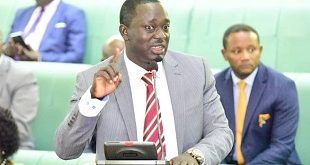
Kampala, Uganda | THE INDEPENDENT | The refusal by the National Unity Platform-NUP and the Forum for Democratic Change-FDC to join the Interparty Organization for Dialogue-IPOD, has raised concerns about the future of the platform.
In 2010, six political parties, the National Resistance Movement-NRM, Forum for Democratic Change-FDC, Democratic Party-DP, Uganda People’s Congress-UPC, the Conservative Party-CP, and Justice Forum-JEEMA pioneered the platform, signing a Memorandum of Understanding.
Through the platform, leaders from different parties held joint activities including a summit, where party presidents met and held discussions on different issues and took decisions. Until the recent MoU expired last year, all these parties had maintained their membership.
A new MoU has since been drafted and signed by the NRM, DP, JEEMA and the People’s Progressive Party-PPP. UPC has asked IPOD to give an update on the implementation of previous resolutions before they can sign the new MoU.
But NUP, the largest opposition political party in Parliament has declined to join, saying the platform is merely a hunting ground for NRM from the opposition but without results to the benefit of Ugandans. Last month, FDC announced that they will not sign the new MoU.
The Netherlands Institute for Multiparty Democracy-NIMD, which hosted the IPOD secretariat and funded several of its activities has also withdrawn its support demanding that NUP and FDC join the platform. Another funder, the Democratic Governance Facility-DGF, is closing operations in Uganda come December 2022, yet there is no budget allocated by Central Government for IPOD activities.
Ndebesa Mwambutya, a political scientist from Makerere University says in its existence, IPOD has borne no tangible fruits because the parties have failed to engage in respectful discussions.
“From the beginning, looking at this term following the 2021 elections, Museveni proclaimed that he would eliminate the opposition political parties. How can you dialogue with somebody who has promised to eliminate you? That would mean that someone is using that platform to eliminate you.” argued Dr. Ndebesa.
Dr. Ndebesa says the fundamental problem is with the ruling party which presides over the whole political order in Uganda. He says the political atmosphere and proper rules of engagement can only be established by the government through changing the current political dispensation, characterized by unfair elections and militarization of the would-be democratic processes.
The Vice Chairperson of PPP, Sadam Gayira says it is unfortunate that the two major opposition parties have chosen to withdraw from IPOD. Gayira blames the NRM government for failure to appreciate the need for dialogue and respect resolutions from dialogue processes.
Gayira also says that issues of human rights abuses and arbitrary arrest of people with dissenting voices could have prompted the two parties from joining IPOD.
According to Gayira, the opposition should not stop dialoguing with the government. He adds that PPP was built on core values of non-confrontation, non-violence, and a peaceful approach to political impasses and for this, they shall stick with IPOD.
Sarah Bireete, the Executive Director of Center for Constitutional Governance says that to assess the relevance of IPOD, one needs to look at its objectives and how much it has achieved in more than a decade of existence. She says while IPOD intended to promote dialogue and strengthen multiparty politics in Uganda, it has achieved too little if any, making it irrelevant.
“IPOD took decisions on Public Order Management Act and improving the context of political party operations in Uganda, were those decisions ever implemented? No. So is it a photo of a good moment, what is it? Because budget arguments can be made before Parliament,” Bireete says.
She says that there seems to be no will by the NRM and the President to hold a meaningful discussion, hence rendering IPOD useless.
Dr. Sabiti Makara from Makerere University says the spirit behind IPOD was good but has failed at implementing of the main goal of dialogue. Despite the opposition’s commitment to the platform, Dr. Makara observes a tendency by the ruling government to treat the opposition as not serious actors of government.
“Government perceives opposition as just a by-the-way, rather than shareholders in the government or it holds them as by stampers or cheerleaders or something like that, so that attitude also I think discourages the opposition,” Dr. Makara said.
According to Makara, failure by the government to implement resolutions passed in IPOD creates a hostile environment for the opposition.
Dr. Makara also says that the nature of politics played by the NUP party doesn’t allow for dialogue. The party, he adds, behaves as though they are very wise and insist on what they desire, leaving little chance if any, for dialogue.
“They are also almost taking the path of NRM which says you either have it or you don’t have it, so NUP seems to be on the same trend of argument of thinking that if they are not heard seriously, then they can’t be part of the discussion”, says Dr. Makara.
He says that the NRM can save IPOD from collapsing because they have the capacity to make the dialogue count.
Frank Rusa, the Executive Secretary of IPOD and Country Director of the Netherlands Institute for Multiparty Democracy-NIMD say that while IPOD is a voluntary platform, it is NIMD’s desire that it is inclusive with opposition political parties like NUP and FDC also participating. He urged the IPOD members to continue engaging the NUP and FDC to join the platform.
There are two main resolutions that were passed by IPOD that have never been implemented.
These include the regulations for the implementation of the Public Order Management Act-POMA which is used by the government to subdue activities organized by Opposition politicians or activists. While the opposition interpreted the law to mean informing the police, security insisted that organizers of a political event needed to seek permission from the police which claimed powers to grant or deny the request. The IPOD Council of Secretary Generals drafted regulations which they adopted, but never presented before parliament for approval.
Another resolution was to the effect that the government increases funding to political parties to a tune of 35 billion from 10 billion shillings and revise the mode of sharing. They also resolved that 15 percent of the money funds the IPOD secretariat, 15 percent be shared equally and the remainder depending on numerical strength. Although the funds were raised, the mode of sharing was maintained, to the benefit of the NRM which has a majority in parliament.
In the new MoU, the parties have introduced a committee to follow up on resolutions passed.
The IPOD has also asked the government through the Minister for Justice and Constitutional Affairs to fast-track the past IPOD resolutions including funding to the secretariat. The Minister of Justice and Constitutional Affairs, Nobert Mao has promised to engage the government on the request of IPOD.
*****
URN
 The Independent Uganda: You get the Truth we Pay the Price
The Independent Uganda: You get the Truth we Pay the Price


